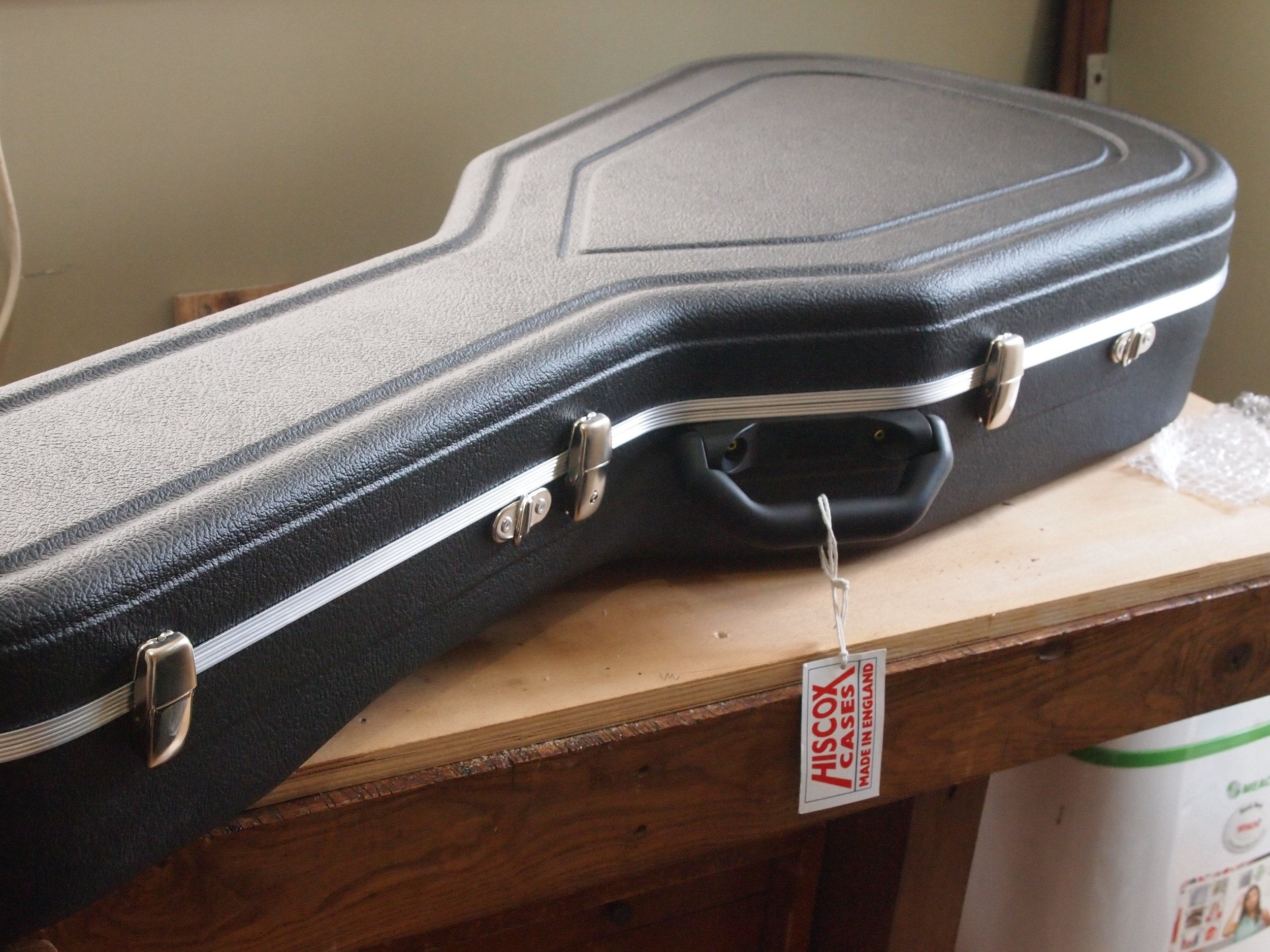Have you ever been caught in the rain with your guitar, hoping that, being in its hard case, the guitar should be perfectly fine - only to discover a wet guitar upon opening the case?! Have you ever been caught in the snow? Have you flown with your guitar? Or travelled to a hot or cold country? If you have done any of these things, then you have learnt the hard way, the sheer importance of a good quality hard case for your classical guitar.
The classical guitar is one of the most delicate musical instruments. Wood is already a material vulnerable to changes in temperature, humidity, moisture etc, and classical guitars are made out of the thinnest plates of wood, often thinner than 2mm. These thin plates of wood are in stasis, in a delicate equilibrium against the tension of the strings, so it’s worth protecting the guitar from the other outside tensions and forces, caused by changes in the environment around the guitar. A hard case is not only to protect your guitar from knocks and falls. In the best guitar cases, you can create the most stable of environments: the warm safe refuge that your classical guitar deserves.
After the expense of buying a classical guitar, perhaps the last thing a musician would want to do is to spend more money on a case. But in my experience, a good case is crucial to not only ensuring the longevity of your instrument - preventing cracks, damage or distortions/warping, but also keeping it sounding its best. Cracks, damage, warping etc; prevention is the best, cheapest and most satisfying cure. Even if the guitar mostly stays at home, on those occasions when the guitar does need to travel somewhere, you don’t want your hard case to let you down. I myself have travelled often with classical guitars, and I have had some quite hair-raising experiences. I would say it is important not only to have a hard case, but a really good one.
What does a good hard case actually do?
The most basic function of a classical guitar hard case is to protect the guitar from knocks and falls. Classical guitars are also vulnerable to changes in humidity and temperature, as well as drafts and direct sunlight. Guitars are particularly vulnerable to sudden environmental changes, and the best guitar cases slow down these changes dramatically, so the environment inside the case will change only gradually, no matter what’s going on outside the case.
A quality guitar case seals off your guitar from the outside world, allowing you to somewhat control the humidity inside the case. This can be done using D’addario humidity packs, or with other similar devices, which keep the humidity within the case at around 50% relative humidity.
For professional classical guitar players, who travel outside a lot, the good case will protect classical guitars from the elements. Professional players can travel to greatly varying environments, and a good case will ensure the guitar survives these changes. Quality classical guitars are expensive, and a good hard case protects the investment, and guards against the need to pay further for repairs or another new guitar.
A case within a case! For some cases, it’s possible to get an extra travelling cover; it resembles a gig bag that goes over the guitar case. It adds an extra layer of protection, particularly against weather such as rain, snow etc.
My Grandpa’s guitar, life without a guitar case:
My Granny and Grandpa’s house was the hub of our family when I was younger, with lots of Aunts, Uncles, and cousins visiting every Sunday. It was a warm place and at its heart was my Grandpa’s old Harald Petersen guitar. It is still a beautiful guitar, and I suppose it made some impression on me back then as I’m still into guitars today. As long as I’ve known it, it looked well aged; brown like an old cello; didn’t look out of place next to the grandfather clock; knocked, splashed, perhaps cracked by happy playing grandchildren.
There were many cracks. It had been left out of a case its whole life, often next to the open door into the back garden. It is a guitar in which time and nature have been left to do their work. A beautiful thing, perhaps the very definition of the Japanese philosophy ‘wabi-sabi’. But with the use of a good hard case, controlling the environment within the case, you can essentially hold back time for your guitar, and keep it sounding and looking at its very best.
Times when I longed for a better hard case for my classical guitar:
Flying guitars. When travelling on planes with guitars, I buy an extra seat next to me for the guitar. (A guitar player should never check their valuable classical guitar into the hold and expect the case to adequately protect it, even an expensive case). I always bring my humidity reader too. You might be surprised to learn that the humidity drops dramatically in the cabin when flying, to as low as 10% relative humidity. It’s really alarming, but a good hard case, as well as a humidity control device such as Dadarrio’s two way humidity packs, would protect the guitar.
A guitar player should never check their valuable classical guitar into the hold of a plane and expect the case to adequately protect it, even an expensive case
Into the frying pan! I have been to Spain twice with my guitars in the middle of summer. Not only is a quality hard case necessary to protect your instrument from the dramatically low humidity, but also from the sheer heat, which can be damaging not only to the wood itself, but also the finish (especially French polish). At high temperatures such as in Spain in the summer, or in a car on a hot day, certain modern glues can soften, causing all kinds of problems, including shifting bridges or fingerboards.
Battling Spanish heat. I recall arriving in Madrid with my guitar, feeling the sheer heat, and wondering if it would be safe to venture even 10 minutes down the road in search of a cash machine, while I was waiting for my next train. With a better case I may have felt more confident. I did meet another guitar maker travelling in Granada in Spain; she had completely wrapped her guitar case in some kind of foil insulating lining, deflecting the sun. It looked completely crazy, but I was extremely jealous, myself only emerging in the mornings and at night, and mostly sticking to the shadows, to protect my guitar.
Slavic ice and blizzards: On the other scale I’ve travelled to Prague in the midst of winter with my guitar: ice everywhere, rain, snow and temperatures of -10. I combatted the challenge of the rain and snow by carefully lining the case opening with door insulation lining. Another challenge was presented by the low humidity in the hotels, caused by the central heating and lack of ventilation. This problem was solved by letting the shower run until the humidity reader showed an acceptable reading, and then leaving the guitar, in its case, in the bathroom. I did wish for a better case on that trip.
English rain. It typically rains a lot in England. The last time I got caught in the rain was after a music festival in Leicester. It was raining heavily, so I ordered an uber to the train station. The brief walk from the uber to the train station in heavy rain was enough for water to enter the guitar case. If a case lets water in that easily, it probably also doesn’t do a good job at protecting the guitar from changing humidity or temperature either, so from that point onwards I did prioritise ‘the seal’ when evaluating hard cases.
My point is: don’t get caught in these situations without a hard case of decent quality.
What qualities are we seeking for in a classical guitar case?
An airtight seal - A good airtight seal will allow you to effectively control the environment within the case, by using something like D’addario’s two way humidification packs.
Lightness - Some cases are heavier than others. Travelling with a guitar or two can quickly become tiring, and the guitar/s can feel like a burden. If you’re carrying a guitar for an extended period of time, you do notice the difference between a 3kg case and a 4kg case.
Good Looking - Having a pro looking guitar case is a great confidence boost.
Durability - I’ve had issues with cases slightly warping, meaning that the seal no longer properly fit together, creating gaps that would allow in water and wouldn't protect the guitar from changes in the environment.
A good fit for your guitar - You shouldn’t have to force the guitar into the case. Nor should the guitar be bouncing around inside the case. You need to be careful when ordering a case online that you check the measurements of the case against the measurements for your guitar. Guitar dimensions, especially in handmade instruments, can vary a bit so it’s with finding the very best sized case for your particular instrument.
Enough protection on the inside - A guitar case should have enough cushioning/padding to protect the guitar against any knocks.
Impact resistance - If you drop a guitar in its case, you don’t want the impact to be passed to the guitar. Some materials are better at this than others.
What are our options?
£100-£500
Hiscox Pro ii classical cases - Here in England, the first hard case to consider is the Hiscox Pro ii, which conveniently come in a variety of sizes too. I think they would be fantastic, my only complaint is I don’t think they have a good seal, which is important if you want to travel with your guitar.
Rokkoman - Rokkoman provides a super light foam case, suitable for some purposes, possibly useful to have alongside a proper hard case. I would personally prefer a full hard case.
Gator - Gator offers traditional wooden cases as well as cases in a similar style to Hiscox. With traditional wooden cases, often the seal is inadequate, making them not great for travelling around outside.
£500 - £1000
Visesnut - Visesnut is a relatively new brand and hugely popular, making light, waterproof carbon cases. Curiously enough, I met the founder, Visesnut, at a classical guitar making competition in Spain, where he came in 2nd or 3rd place. So he’s a talented person.
Bam - Bam cases look like a good alternative to Visesnut
Crossrock - Crossrock offers a carbon case, in a similar style to the more expensive cases in this list.
£1000+
This range of cases would appeal to the musician who travels a lot with their guitar, not just by plane but I mean out and about in general. Brands include Accord, Pegasus, CC Cases, Calton Cases.
In Conclusion:
I often travel with guitars I’ve built, so that's a very precious cargo. I partly wrote this article for myself, to see which case would be best for me, and which cases I would be happy to provide to my customers along with the guitars. Looking into the qualities of the different cases on the list, I like Visesnut and Bam cases best of all. If I had loads of money, I’d explore the more expensive cases as well. Given my knowledge of the construction of the guitar, my priorities are firstly an airtight seal and waterproofness, and after that I look at all the other things you would expect from a good guitar case. Bam’s ‘classic’ classical guitar case is cheaper than their lighter models. Because I’m not concerned with getting the very lightest case, the classic model would suit me fine.





